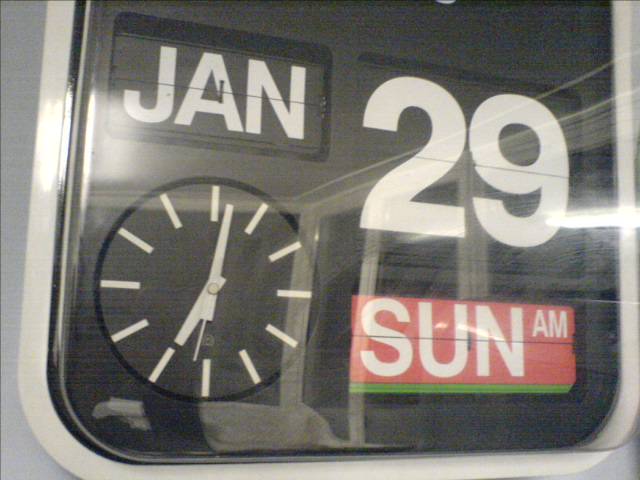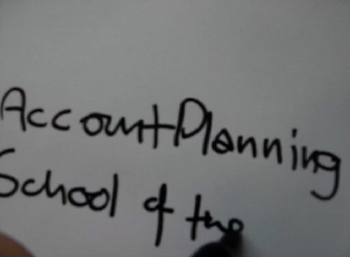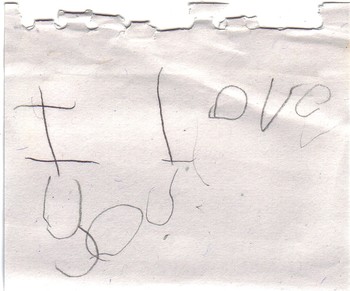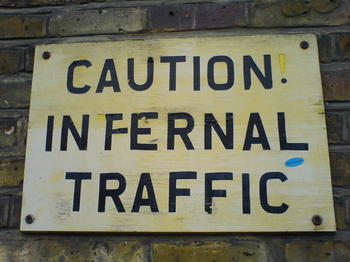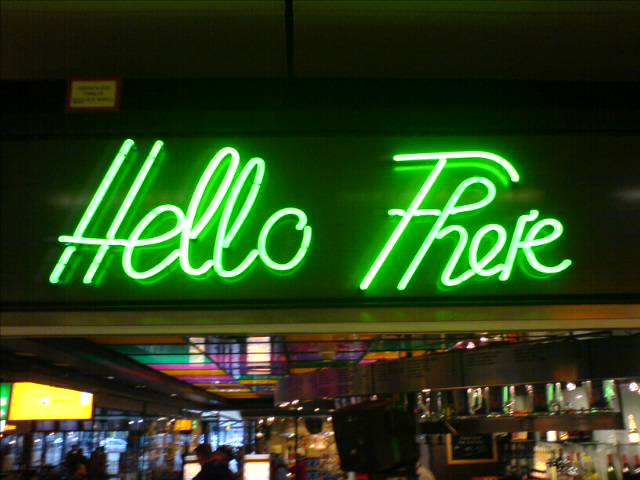Russell Davies
As disappointed as you are
About | Feed | Archive | Findings | This blog by email
« December 2005 | Main | February 2006 »
Kitchen clock
January 29, 2006 in diary | Permalink | Comments (1) | TrackBack (0)
Account Planning School of the Web - 3rd assignment - here are all the anwers
This is a hugely long post. Sorry about that. But it seemed the best way to do it. As you'll see I've listed everyone's answers after each question. And then I'll comment at the end of each question.
1. A leading retailer wants to create an equivalent of The Gap aimed at the over 60s. What should the key communications idea for that store be?
a. Growing old no longer means cardigans and slippers. Quality clothes at reasonable prices, designed to make over 60’s look good, not look old. Style without shock or high cost.
b. “Simple Sophistication” The anti-department store.
c. Over 60s are still vibrant. Remind them that looking and feeling attractive and hip isn’t just for the whipper-snappers. They should show ‘em how it’s done.
d. Show that all ‘modern’ fashion derives from key staples from the past. "Real style doesn’t age".
e. The fashion of freedom. Clothing and communications should reflect the liberated, self-assured, ambitious attitude of the modern over 60 population.
f. Liberating clothes to be worn with friends: well-earned freedom from work, enjoyed together. "I can be relaxed, and confident; we all can. We can share a new style.
g. FOR THE YOU THAT WILL NEVER DIE.
h. "We have the styles you like and we carry them in your size." Of course the latter point should be expressed tactfully
i. Store name: 29. Old style Gap clothes - when they were quality staples - cotton and velvet tees, cashmere/silk/cotton sweaters, jeans, skirts, linen shifts etc. All material is solid colour…
j. When you’re a 60 you also can feel: young, in fashion and stylish because Age doesn’t wear in clothes, dress yourself as you feel
k. Classic comfortable style that looks as active as you feel.
l. Grandparenting" clothing is the key idea here. Highlight durability, stain-resistance – clothes that help you enjoy life as a grandparent.
m. Comfortable active success
n. Stylish comfortable clothing that’s easy to get on and off.
I’m not sure there’s anything that’s genius in this list. But there’s nothing really stupid either.
Most of these aren’t really a sharp coherent, distinctive positioning idea they’re just reasonably sensible ideas for such a store.
There’s not a lot that’s memorable or compelling.
‘For the you that will never die’ is bold, because it mentions death and therefore sticks out, but I don’t think it means anything. (Or I’m not sure what it means anyway)
Things like ‘comfortable active success’ and ‘classic comfortable style that looks as active as you feel’ aren’t stupid but they’re a little boring. There’s not enough idea there, just a bunch of the right kind of words. Something like ‘We have the styles you like and we carry them in your size’ is just the basics for any store.
Answers like c, d, e, f, I, j aren’t ideas either, they’re maybe thinking on the way to ideas. But they’re mostly just telling me something about the audience and therefore what the idea should be like.
This one - Grandparenting" clothing is the key idea here. Highlight durability, stain-resistance – clothes that help you enjoy life as a grandparent. – is at least an idea. You can imagine how this would be different , clothing explicitly designed to aid your life as a grandparent – you can imagine extra padding at the knees and chocolate resistant lapels. So there’s something good in it (though some would argue that this, like many of the others, has a slightly clichéd view of the over 60s). And I think you could have expressed it more pithily. Something like ‘workwear for grandparents’ would have got it over much more quickly.
So. Not a great start but it’s early days. I’m expecting great things.
2. A leading car brand wants to create a loyalty programme that ensures their over 50s customers come back and use authorised dealerships for their service and maintenance. They want to use direct mail to do it. What should the main idea for that be?
a. Trust and experience. “You trust us, and we will honour that trust when we maintain your car.” Show that custom is valued, and they will not let them down.
b. "We know your car as well as you. And how’s the family?” Requisite loyalty benefits offered, but secondarily to singular personal service. Neighborly; the way customer service used to be.
c. Trust. They have already established a reliable relationship with the dealer. We’ve been with you since the beginning. Why go to a stranger?
d. Here’s a pair of slippers for you. Put them on. Relax. Your service starts here. Call this number, we’ll take care of everything. (send quality slippers, show you’re serious)
e. Send customers a replica key with an ACME logo in place of the brand logo. Without authorised service, you’re really not driving the car you bought anymore, are you?
f. Introduce real, mature, regional staff who represent the brand. Emphasise quality, and gently challenge - "People as dependable as the car we sold you. Who do you trust?”
g. MAIL THEM A BROKEN RUBBER BAND. "IT'S AMAZING HOW FAR SOME PEOPLE WILL GO TO SAVE MONEY ON GETTING THEIR CAR SERVICED"
h. "Our dealers specialize in servicing our cars, so they know more about them than anyone else. You can count on us." Include a coupon for free service to encourage trial
i. Brilliant service with the personal touch.
j. Valuable values:
COMFORT:Car Service at home + Personal Appoinment
TRUST : the best people who knows your car / extra guarantee
PROMOTION MEMBER GET MEMBER : free oil change
k. You wouldn’t trust your health to just anyone so why trust your car to just anyone? Make sure you come in to our authorized dealerships for a free health check.
l. Send out a crew to detail the car for free once. The guys are your direct mail, send them instead of a postcard.
m. 500,000 km and still luxurious
n. Premium service for you and your car: pick up service, loaner vehicles, and detailing all included with every service for the same standard price.
Hmmm. This is where it gets slightly tricky. What’s the difference between strategic idea and executional idea. I don’t really know. And all I asked for here is a ‘main idea’, so I guess you could have done either.
Personally I’m drawn to the more executional things here like ‘slipper, key and RUBBER BAND (please don’t write in all caps, it’s like you’re SHOUTING AT ME) because I can at least react to them at a human level. i.e. does that seem like a good idea or not? Many of the rest are a little bland.
Slipper I’d say is quite funny and therefore memorable but risks patronizing people. Polarisation can be cool if enough people love what you’ve done but you’d be sailing close to the wind. It would need to be delicately handled.
Key I like conceptually but it might be too abstract an idea. Rubber band is simple and pointed, not sure it quite hits the brief.
There’s a good territory in "We know your car as well as you. And how’s the family?” - old-fashioned service values, family business feel, they’re all good. But I’m not sure you’ve quite found a phrase to bring it to life for me. And it’d be good to have a key example of how those values manifest themselves rather than just saying trust a lot. Some of the other thoughts people had – free detailing, service at home - are good specific offers that might have supported this.
Unfortunately the entries we had with specific things weren’t wrapped in a bigger idea, so they just became product/service promises.
I think this is the tension on this exercise so ‘brilliant service with a personal touch’ is nice, but I’d love a proof point. And this “Send out a crew to detail the car for free once. The guys are your direct mail, send them instead of a postcard.” Is a good idea but it’s not part of a larger thought.
The ideal answer to this question would have contained – interesting idea + example that brings it to life. All expressable as a piece of direct mail. The best I could do off the top of my head would be:
“Friendly, personal service like you’d get in a Doris Day movie. Bring in this coupon for a free service with free coffee and homemade cookies.”
You see what I mean? There’s a lot wrong with it, but it conjures up an idea of what the experience will be like and it offers a tangible proof point. I guess ideally the ‘coupon’ would be something like a cookie or something. Hopefully the creatives would make it better.
3. An innovative entrepreneur wants to create a fast food or coffee bar chain targeting affluent over 50s. What should their strategy be?
a. Show a calm place; fast food but without the hustle and bustle. Comfortable and clean, somewhere you can have a relaxed chat over a meal or drink.
b. “Why mess with perfection?” Luxuriate in the flavor of pure coffee and shun drinks that require a glossary to order.
c. The best part of work is the social aspect - water cooler conversation. They don’t have to miss out on that just because they’re retired.
d. Tomorrow: The best quality food/drink available today (expertise/quality), take your time to relax (trust) and enjoy it (experience).
e. Global grazing. Small, easily grouped servings, each no more than 250 calories, with a constantly rotating list of foods from around the world.
f. Locate alongside boutique home-furnishing stores, initially. Use these neighbours' products in-store. Look stylish, individual but restrained. Become known for signature dishes. Serve warmly. Give the customer time.
g. SHOPS ONLY OPEN TO PEOPLE WHO ESTABLISH A CASH ACCOUNT WITH COMPANY. MEMBERS GET SMALL BRANDED WIRELESS DEVICE THAT AUTOMATICALLY TALLIES AND AUTHORIZES PURCHASES. BEAUCOUP LOYALTY ADVANTAGES AND CROSS-SELLING OF BRANDED GOODs
h. Justify a premium price by offering tasty, organic, low sodium foods. The organizing concept would be a heart healthy "Mediterranean Diet
i. Strategy: Fast, premium quality with a heart - example: drive through gourmet carry out food and fairtrade only drinks.
j. To be the Starbucks of the Healthy life and connect with 50 s about manners : excellent customer service, comfort and meeting areas.
k. Café-luxe – a premium coffee bar for those who’ve earned the rite of passage. Not your run of the mill coffee. Decadent cappuccinos, explosive espressos, soothing Irish coffees, naughty affogatos.
l. Make this crowd feel good about buying coffee by offering only shade-grown/environment-friendly/fair-trade beans.
m. Comfortable Energy - coming together around coffee for games and conversation.
n. Delicious quick serve food tailored to specific health concerns.
Now we’re getting somewhere, this is better.
I think this one - 'Global grazing. Small, easily grouped servings, each no more than 250 calories, with a constantly rotating list of foods from around the world' – is my favourite. I’ve no idea if it’s a good restaurant strategy or not, I know nothing about restaurants but I do instantly know:
It’s specific – I can imagine what it’ll be like. And not like.
It’s memorable – global grazing is a memorable phrase. The whole idea communicates quickly.
It’s distinctive – I can’t think of anywhere else like this.
It’s relevant – (sort of) I can see our age group liking the calorie controlled aspect of it, and the novelty value of food from around the world.
I also like n. because of it’s distinctiveness and relevance – I can see people with all kinds of allergies and concerns wanting to find a fast food place for them. Quite a few of you did health and I think this makes sense.
I also like the ones with insights around sociability (c and m especially). I find the environmentally focused ones less convincing but that’s probably just because I’m an old git.
The wireless / cash account thing is interesting because it seems a little mad. I’m not quite sure of the consumer benefit but at least it’s noticeable.
Again I find that things like d and f are perfectly sensible but they’re just collections of the right kind of words. There’s not enough focus or thought devoted to phrase-making, that’s a core skill we’re trying to develop here.
4. Most people in their 20s aren't investing in pensions or thinking about how they'll finance their retirement - how would you persuade them to do so?
a. People in their 20’s ignore the concept of growing old. Focus on “Living for today!” except that /today/ is after their retirement. By saving now old age needn’t be dull.
b. “You’re not saving, you’re spending more later.” Program: Partner with banks--customize savings. No longer pension but “John’s Travel Fund” or “Fabulous Shoes at 55”. Tone: tantalizing, decadent
c. Growing old isn’t real to 20-somethings, but family is. Connect their present familial inheritance ("I have my grandmother's eyes") to their family circumstances... from which they can learn.
d. Demonstrate the gap between the quality of life people desire and what they’ll be able to afford. Could be acheived using a non-threatening interactive tool.
e. Hire Johnny Lydon as the spokesperson. Show that the future is inevitable – even if you don’t think so when you’re twenty-one – and it’s best to plan for it.
f. Future wealth = Status now Attach status to projected pension fund size. Identify the lowest-status (non-essential) spending habits. And attack their status further. Use digital and outdoor.
g. CONTRASTS BETWEEN TWO EXTREME OPTIONS: MANSION VS SHACK, LUXURY CAR VS JALOPIE, CANDLE-LIT DINNER VS TIN OF BEANS, CRUISE IN FJORDS VS DESOLATE MOTEL, ETC. "WHICH IS YOUR DREAM?
h. Remind them that when they were 15, age 25 seemed an eternity away--but it wasn't. So the time to start thinking about retirement is right now
i. Message: Remind them it's all about sexual attractiveness - save now, reap the reward when you're older.
j. idea : you will want to continue enjoying yourself, young people has time & no money in 30 s money but no time, so if you want both things together in the 50s, think in a retirement plan.
k. Don’t be forced to change your lifestyle when you age – start investing now. Develop ad campaign with old people wearing hip hop gear and bling-bling.
l. "You don't have to live on Ramen noodles anymore, but think about your spending" – With time, money grows into something huge, compound interest is the key benefit here.
m. $20 now could be $2 million when you retire. Think Now
n. In the game world you can earn bonus lives. In the real world you can earn a life bonus. Earn a life. Invest.
This is a very hard problem to solve. Governments have tried it. Huge pension firms have tried it. None of them can do it. So I didn’t really expect you to do it. And you’ve not. But there’s some interesting thinking in here.
I think my favourite is ‘you’re not saving now, you’re spending more later’. It’s simple, clear and motivating and it’s been brought to life quite interestingly.
The John Lydon idea is interesting, he personifies the issue well.
The various contrasting ideas are good and I can see how an interactive tool would work. But on the whole, most of these are mainly statements of the obvious. The make sense, but they’re not powerful communications ideas. (And then, there’s a couple I just didn’t understand.)
And here’s a quick thought – I set a limit of 30 words for a couple of reasons. One, to make it easy for me. Two, to try and give you some practise in précis. It slightly defeats the object if you write paragraphs explaining your idea and then present me with a couple of quick sentences. The idea is to compress your thinking into 30 words, not use those words as headlines for some longer piece.
5. A health care company has realised that the affluent, demanding boomer generation in the US is starting to need critical health care, retirement communities and hospices, but they don't want the grimy, depressing places where their parents went to be cared for and to die. How would you position a total health-care business for this generation?
a. Focus on being helped, not on being ‘cared for’, which has demeaning connotations. Show that ‘looking after you’ includes maintaining a sense of community, activity and most of all, life.
b. Retirees: younger, healthier, more active than ever. “360° Living Communities” The serenity of home. Access to myriad entertainment options. Holistic healthcare. Preventative, cosmetic, geriatric medicine onsite
c. The boomers felt helpless watching their parents age and die. Everything about this business should be about putting them back in control.
d. Long stay wellbeing hotels". People are now familiar with (and aspire to) Yoga Holidays, Experience Gifts, Spa Weekends. This is the ‘sunset’ version…
e. The Four Seasons with integrated health care. Position the facility as a reward rather then as the morgue waiting room. Establish partnerships with luxury brands for food, transportation, travel
f. A place to continue living. Position quality care as a prestige item, and care homes as desirable real- estate. Show interior space, and outdoor light
g. YOUR CLUB MED
h. Such communities should emphasize the opportunities for boomers to pursue an active lifestyle, offering amenities like state-of-the-art fitness centers and superior recreational options.
i. The Health Care company that thinks it's a university.
j. You are not alone, We are people & professionals ready to care for you, in order to enjoy a positive experience together with all the people we care.
k. You’ve never compromised before, don’t compromise now. 5 star living. Premium comfort. Pure pampering.
l. "The golden years are golden again." Offer posh pads for living (plasma televisions, "rain" showers, etc.) and luxury cars (Audi convertibles, etc.) for renting. Enjoy your life with us.
m. Be with friends in a place with a view
n. Your grandchildren think it’s a resort. Your children think it’s a vacation. To you it’s home. But if a medical emergency arises, you’ll be glad it’s Total Health.
Better again. Hard to choose a favourite this time. I think the three best are:
The Health Care company that thinks it's a university.
YOUR CLUB MED
Your grandchildren think it’s a resort. Your children think it’s a vacation. To you it’s home. But if a medical emergency arises, you’ll be glad it’s Total Health.
They all do more than just describe a better version of what’s already on offer (better facilities, more pampering etc). Instead they recontextualise the retirement community – make you think about it completely differently. The best is probably ‘the health care company that thinks it’s a university’. It’s different enough to make you think, and when you’ve thought about it, it’s really appealing. Suddenly there’s this idea of ‘third age’ as a time for new learning and new experiences, in a welcoming community with its own rules, habits and traditions. That’s a lovely idea.
Your club med is a little simpler, but still powerful. You see how three well chosen words can encompass a lot of thinking? That’s something to aim for.
And I like the third one – your grandchildren etc – because it makes you realize that there’s more than one audience for this campaign, and it has some of the ‘my club med’ quality to it.
The rest are all fine, but the re-positionings are just slight, from retirement home to hotel isn’t enough of a shift. One thought - why did everyone start to talk about luxury - surely there might have been an interesting idea in going the other way- certainly a lot of business opportunity.
Does that all make sense? I hope so.
I think the most useful thing you could all do here is just to read through them all and notice which ones sing out to you. Which do you remember? Which are the ones that create images in your head? Which contain new and interesting ideas?
If you think about that, you’ll probably get a lot from this exercise.
Hope you enjoyed it.
Thanks all.
January 28, 2006 in Account Planning School Of The Web | Permalink | Comments (8) | TrackBack (0)
hissy video
January 28, 2006 in Account Planning School Of The Web | Permalink | Comments (1) | TrackBack (0)
a little local difficulty
Blogging turns out to be hard.
But it turns out to be harder when people of read the thing and decide to interact. In the past few days I've been slightly rude to Iain and a bit more rude to David. (see the comments on this post). I have no excuse really. I probably wouldn't have been if they'd been having a go at me (and 'having a go' is putting it a bit strong), but I felt bad because Dylan had volunteered his time for an interview and then got misinterpreted and attacked.
But I should remember that's what this stuff is all about. It's good that people post comments, and good that they disagree. So if I'm rude to people - I'm sorry, I don't mean to be. I've been a bit grumpy for the last couple of days.
And all the people waiting for the results on the third assignment - I'll get to it at the weekend. You should have something on Monday.
January 26, 2006 in huh? | Permalink | Comments (4) | TrackBack (0)
comic life
Alex at Lights Out Films pointed me at Comic Life and it's absolutely brilliant. A quick, easy genius way of making comic books out of your life/photos. I think it's Mac only right now but it's fantastic. Arthur and I have been having big fun with it.
It would also be a great way to do more interesting presentations.
January 25, 2006 in ideas | Permalink | Comments (4) | TrackBack (0)
